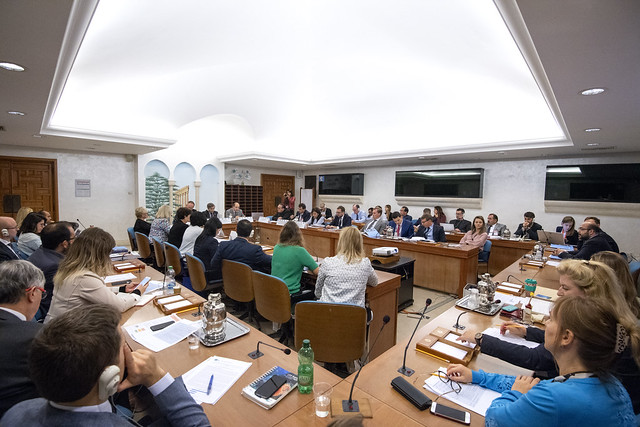Migration and Remittances in Central Asia and the Caucasus can be an opportunity for nutrition and rural development

A multistakeholder meeting on migration and remittances in Central Asia and the Caucasus took place in Rome on 19 October 2018, during the 45th session of the Committee on World Food Security. The event was organized by FAO and the Russian Federation with the objective of increasing awareness on importance of migration in the region and discussing the potential of attracting remittances from migrants to invest them in agribusiness for rural development.
Over 60 participants from FAO, other UN agencies and countries of the region took part at the event. The keynote speakers and the special invitees from the government of the countries the most affected by migration in the region: Armenia, Georgia, Kyrgyzstan, Moldova, Russia and Tajikistan.
The scale of human migration in the 21st century is at its highest point in history, reaching 258 million people in 2017. The Russian Federation occupies the third place among the top destination countries for international migration and is the first destination in South-Eastern Europe, Europe and Central Asia, hosting mostly migrants from Armenia, Kyrgyzstan, Moldova, Tajikistan, Ukraine and Uzbekistan. These countries are the largest sources of labour migration in the Caucasus and Central Asia region as well as the largest recipients of remittances, which constitute a significant share of their GDP. “Only in 2017, labor migrants from Armenia, Tajikistan, Kyrgyzstan and Uzbekistan working in Russia sent more than 5 billion US dollars to their homeland. There is a rational need for effective measures to use remittances to create their own productive potential”, said Mr Eugeney Bessonov, the Deputy Permanent Representative of the Permanent Mission of the Russian Federation to FAO and other international organizations in Rome. – “Together with partners in the Eurasian Economic Union, we form a common labor market and develop a common policy in the field of labor migration. The migration should be used for the benefit of the development of countries, for both the states-recipients and states of origin”.
At the event, the experts from the involved countries, presented and discussed challenges, consequences and opportunities ofinterregional migration faced by the destination country in the context of the policy response. The event looked across food security and nutrition, social protection and rural development issues to discuss policy options.
Some countries in the region are taking concrete steps and already have solid evidences. For instance, Moldova’s successful national Programme for Attracting Remittances into the Economy – known as PARE 1+1 - helps direct the sizeable remittance inflows towards the creation and expansion of micro, small and medium enterprises. These enterprises in turn act as engines of sustainable growth and macroeconomic stability. From 2011 to 2017, approximately 1100 business projects were financed with remittances amounting to about EUR 10 million. This attracted a further EUR 34 million in investments in the economy and led to the creation of nearly 3 000 jobs. Approximately 70% of investments went to the agricultural sector.
With the technical support from FAO and the financial from Russian, the Government of Tajikistan plans to implement a similar model, entitled, “Promoting inclusive economic growth through Matching Grants.” The aim is to help attract the remittances of migrant workers to investment in agriculture and agribusiness. Beneficiaries will receive matching grants for small-scale projects, including training and education.
This event was a great opportunity to help provide a clearer picture of the policies that are required to deal with the migration issue. This includes exploring new markets for labour migration; strengthening economic protection, social and legal rights of migrant workers; stepping up social protection; providing capacity development for the establishment of professional qualifications; and strengthening public and private partnerships for rural development.
“International migration has become an integral part of the region’s rural societies and given the profound implications it has for broader rural development, its inclusion in the policy-making and development processes has become indispensable”, said Mr Mauricio Rosales, the senior coordinator of the FAO project “Developing Capacity for Strengthening Food Security and Nutrition in Selected Countries of the Caucasus and Central Asia”.
PHOTOGALLERY
©FAO/Carlo Perla.

